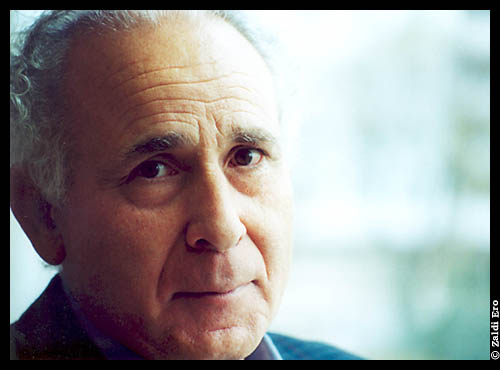Joxe Azurmendi
Joxe Azurmendi Otaegi ( born March 19, 1941 in Zegama, Basque Country ) is a in Euskara, the Basque language that is writing Basque writer, philosopher, essayist and poet. He has published numerous articles and books on subjects such as ethics, politics, philosophy of language, art, Basque literature and general philosophy.
Joxe Azurmendi is director of the publication series Jakin irakurgaiak in which under his leadership so far over 40 books were issued. In addition, he has worked on the translation of philosophical works into Basque for the publisher Klasikoak. He was one of the founders of Basque Summer University, Udako Euskal Unibertsitatea. He currently holds the Chair of Modern Philosophy and teaches at the University of the Basque Euskal Herriko Unibertsitatea. In 2010 he was appointed by the Academy of the Basque language, Euskaltzaindia, the academic honorary member. Joxe Azurmendi is one of the most brilliant and most knowledgeable thinkers of the Basque Country for many.
Biography
Joxe Azurmendi studied philosophy and theology at the Basque University, as well as in Rome and the Cathedral.
In the early 60s he joined the cultural movement around the magazine Jakin. He was direct the magazine when it was banned for the first time by the Franco regime. Since the resumption of their appearance Azurmendi is a regular contributor to the magazine. The first years of the 70s, he devoted himself to the dissemination of basic texts in Basque language on topics that were discussed in the Basque Country: nation, socialism, internationalism, etc. In the 80s he began to teach at the Basque University. In 1984 he presented his dissertation on Jose Maria Arizmendiarrieta, the founder of the cooperative movement of Mondragón ago. In it he represents that Arizmendiarrieta intention with this project to merge the individual and society in the context of an organization, which combines socialism and French personalism.
In 1992 he published Espainolak eta euskaldunak [ Spaniards and Basques ], his most famous work. It was a response to a text by Claudio Sánchez Albornoz, in which it says: " The Basques are the last to have become more civilized in Spain; compared to all other peoples, they lack one thousand years of civilization ... They are rude, simple people who also consider themselves to be children of God and heirs of his heavenly kingdom. They are nothing more than non- Romanized Spaniards. " In his work Azurmendi refuted the stereotype of some Spanish intellectuals of the Basques.
At the beginning of the 21st century, his work reached its peak. He published the trilogy Espainiaren arimaz [ The Spanish soul ] (2006, Elkar ), Humboldt. Hizkuntza eta pentsamendua [ Humboldt. Language and thought ] (2007, UEU ) and national spirit. Herri gogoa (2008, Elkar ). This trilogy reflects the most important aspects of his thought.
His thinking
The work of Azurmendi created and developed in an era of crisis, both on a cultural or political level and with regard to the existing values . A crisis that he has not seen as something negative, but as an opportunity for new possibilities. Therefore, his whole thinking revolves around the defense of freedom in all areas, but especially of conscience and freedom of thought.
Consequently, it is in his work not to escape this crisis; rather Azurmendi has been reflecting on how to live in such a situation. He uses a relativistic approach and fights after the modernity of the people has deprived of any solid foundation, against the last vestiges of dogmatism to which a crisis tends society. In this sense, he shows himself as critical of the modern state, which he accuses of being the new church, which controls consciousness. He criticizes the instrumentalization of morality, or in other words that the politicians, instead of solving the problems in their respective areas of competence, to flee to the field of morality to conceal their responsibility under the guise of supposed absolute principles.
Of great importance is its contribution to the questioning of the canonical view that on certain issues was developed. Of particular note is here, thanks to his German education and studies, the interpretation Azurmendis the German Enlightenment. With it, he refuted the apparent contrast between the French Enlightenment and German Romanticism, and opens up a new perspective on the various aspects deriving from this contrast. Unlike some Spanish and French intellectuals (Alain Finkielkraut ) he represents that nationalism began in France ( Montesquieu, Voltaire, Rousseau, Ernest Renan ) and was then reinterpreted by the German Enlightenment and Romantics. He represents the way in question, in which authors such as Goethe, Schiller, Herder, and Humboldt metaphysical nationalism is attributed.
A not insignificant part of his work devoted Azurmendi beyond Basque thinkers, he brought out of oblivion, reinterpreted and freed of different stereotypes. Here are, inter alia, his work on Jon Mirande, Orixe and Unamuno called.
Joxe Azurmendi is an author who thinks of Basque culture and out of this. In areas such as the language, he was influenced by the Basque authors of the postwar era. For this field, he has also conducted research on authors such as Heidegger, Wittgenstein, George Steiner or Humboldt. The fact that he has written his extensive work in the Basque language, is in complete coherence to his thought.
His thinking first appeared in his poems:
"Man is poor,
"But the absence
His work
The database of the Basque scientific community Inguma leads more than 160 publications from Azurmendi.
Essay
- Hizkuntza, etnia eta marxismoa (language, ethnicity, and Marxism ) (1971, Euskal Elkargoa )
- Kolakowski ( Kolakowski ) (1972, EFA). In collaboration with Joseba Arregi
- Kultura proletarioaz ( About the proletarian culture) (1973, Jakin EFA)
- Iraultza sobietarra eta literatura ( The Soviet Revolution and Literature ) (1975, Gero Mensajero )
- Gizona Abere hutsa there ( Man is nothing but an animal ) (1975, EFA)
- Zer contrasting Dugu Orixeren? (What speaks against Orixe? ) (1976, Jakin EFA )
- Zer Dugu Orixeren alde? ( Why Orixe? ) (1977, Jakin EFA )
- Artea eta gizartea ( Art and Society ) (1978, Haranburu )
- Errealismo sozialistaz ( Socialist Realism ) (1978, Haranburu )
- Mirande eta kristautasuna ( Mirande and Christianity ) (1978, GAK )
- Arana Goiriren pentsamendu politikoa ( The political thought of Arana Goiri ) (1979, Hordago Lur )
- Nazionalismo Internazionalismo Euskadin ( nationalism internationalism in the Basque Country ) (1979, Hordago Lur )
- PSOE eta euskal abertzaletasuna ( The PSOE and the Basque Patriotism ) (1979, Hordago Lur )
- Schopenhauer, Nietzsche, Spengler, Miran Their pentsamenduan ( Schopenhauer, Nietzsche, Spengler in thinking Mirandes ) (1989, Susa )
- Miran Their pentsamendua ( Thinking Mirandes ) (1989, Susa )
- Gizaberearen bakeak eta gerrak (peace and wars of the animal people ) (1991, Elkar )
- El hombre cooperativo. Pensamiento de Arizmendiarrieta ( The cooperative person. Thought Arizmendiarrietas ) (1992, Azatza )
- Espainolak eta euskaldunak ( The Spaniards and Basques ) (1992, Elkar )
- Karlos Santa Maria. Ideiak eta ekintzak ( Karlos Santa Maria. His thinking and acting ) (1994, Gipuzkoako diputazioa ( Unreleased ) )
- Demokratak eta biolentoak ( Democrats and violent offenders ) (1997, Elkar )
- Teknikaren meditazioa ( Reflections on Technology ) (1998, Kutxa Fundazioa )
- Oraingo Gazte eroak ( The Crazy Youth of Today ) (1998, Enbolike )
- Euskal Herria krisian ( The Basque Country in Crisis ) (1999, Elkar )
- Etienne Salaberry. Bere pentsamenduaz ( Etienne Salaberry. His thinking ) ( 1903-2003 ) (2003, Egan )
- Espainiaren arimaz ( The Spanish Soul) (2006, Elkar )
- National spirit. Herri gogoa (2008, Elkar )
- Humboldt. Hizkuntza eta pentsamendua ( Humboldt. language and thought ) (2007, UEU )
- Azken egunak Gandiagarekin ( The last few days with Gandiaga ) (2009, Elkar )
- Bakea Gudan ( Peace in War ) (2012, Txalaparta )
- Barkamena, kondena, tortura ( forgiveness, punishment, torture ) (2012, Elkar )
- Karlos Santamariaren pentsamendua ( Thinking Karlos Santa Maria ) (2013, Jakin / EHU )
Poetry
- Hitz berdeak [ immaturity words ] (1971, EFA)
- XX. mendeko poesia kaierak - Joxe Azurmendi (2000, Susa ), [ books of poetry of the 20th century - Joxe Azurmendi ] edition of Koldo Izagirre.
Articles in Journals
- Article in the journal Jakin
- Article in the journal Anaitasuna
- Article in the journal RIEV










